The year 2020 holds special significance for eye care providers and vision scientists—it’s a reminder that in our ideal world, everyone everywhere would have 20/20 vision. This month, as part of Harvard Ophthalmology’s 2020 Vision—A World Without Blindness initiative, Focus is highlighting the Department of Ophthalmology’s groundbreaking achievements in education over the past 20 years and sharing its vision for the future.
Over the past two decades, Harvard Ophthalmology and Mass Eye and Ear have refined their education programs to continue to challenge and inspire future leaders in ophthalmology. Today, approximately 1 in 4 ophthalmology department leaders in academic institutions across the United States and Canada received postdoctoral training through Harvard Ophthalmology.
As we look to the future, our education strategy aims to address key challenges within the field, including the need for a more diverse workforce, virtual and collaborative learning tools, and wellness and resiliency support and resources.
An innovative residency program
Offering a broad clinical and surgical experience, first-rate mentoring and unparalleled research opportunities, the Harvard Ophthalmology Residency Program is one of the best and most competitive ophthalmology training programs in the country.
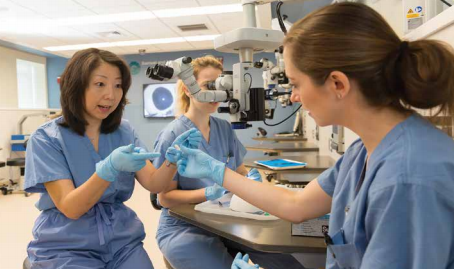
“We select residents with potential to be leaders in the field of ophthalmology and support them throughout their training so that they can achieve the diverse goals they arrive with,” said Alice Lorch, MD, director of the Ophthalmology Residency Training Program. “We make sure they have broad patient exposure and increasing clinical responsibility during their three years of training and also provide them with access to global health opportunities.”
Numerous programs and innovations have created a more effective training environment for residents over the past 20 years, including:
- The state-of-the-art Samuel and Nancy Jo Altschuler Surgical Training Laboratory, which includes a Virtual Reality Surgical Simulator and video streaming capabilities
- The Cataract Master tool, a computer-based simulation tool to help trainees learn cataract surgery
- Monthly Innovation & Interaction Workshops to provide residents surgical training in all areas of ophthalmology
- Nationally recognized Cataract Course that draws 120 second-year residents from across the country
- A rotation at Aravind Eye Hospital in India, where residents participate in cornea, glaucoma and uveitis clinics with exposure to inflammatory and infectious diseases that are uncommon in the U.S.
Take a virtual tour of the Ophthalmology Residency Program:
Fellowships: subspecialty leaders in training
The clinical fellowship programs at Mass Eye and Ear cover all ophthalmology subspecialty areas. From 2007 to 2009, seven Mass Eye and Ear fellowships were certified by the Association of University Professors of Ophthalmology Fellowship Compliance Committee (AUPO FCC)—a national organization that sets the standards and program requirements for ophthalmology clinical fellowship programs across the country. In the last 20 years, the following fellowships were established at Mass Eye and Ear:
- Ophthalmic Plastic and Reconstructive Surgery
- Medical Retina
- Anterior Segment
- Ocular Oncology
View the full list of Mass Eye and Ear fellowships.
2020 Vision: preparing for the challenges of tomorrow
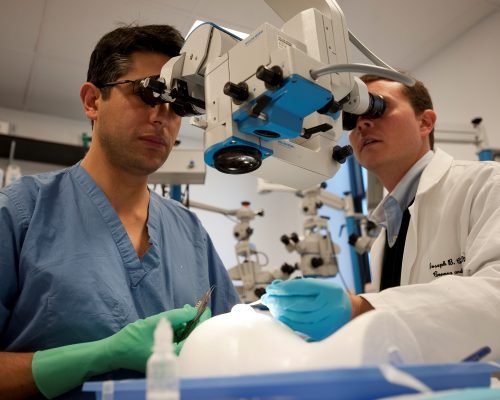
As we look ahead to the next 20 years in ophthalmology education at Harvard Ophthalmology/Mass Eye and Ear, department leaders will continue to innovate, adapt and provide world-class training to the next generation of ophthalmologists.
Creating a more diverse ophthalmology field
One core goal is to create a more diverse ophthalmology workforce. Evidence suggests that diversity throughout an organization leads to better decision-making and an expanded capacity to understand patients’ needs and values. Specifically, diversity within the physician workforce that mirrors the patient population being treated has been shown to provide better clinical outcomes.
With this in mind, Harvard Ophthalmology is developing a program, tentatively called “Scientists Underrepresented in Vision,” to expose medical students who are underrepresented in medicine to the field of ophthalmology. It is also participating in a national mentoring program led by the American Academy of Ophthalmology, the Minority Ophthalmology Mentoring (MOM) Program. The MOM Program aims to provide mentors to first- and second-year underrepresented medical students who have an interest in ophthalmology and to help third- and fourth-year students, who already know they want to study ophthalmology, identify educational gaps, match into residency programs and begin their careers.
“Mentors provide valuable advice and guidance on creating a proper residency application and obtaining letters of recommendation,” said Dr. James Chodosh, associate chief of Ophthalmology Education at Mass Eye and Ear and director of Diversity and Inclusion for Harvard Ophthalmology. “For example, I have several medical student mentees who are the first person in their family to go to college. Mentorship by someone who has been through the process can be game-changing.”
Improving ways to learn
The second core education focus area for the future is creating new, more adaptive ways for trainees to learn. Case-based collaborative learning will increasingly replace the lecture-based model of teaching. This method has been shown to increase analytical, problem solving and teamwork skills.
Our program’s hands-on, interactive surgical training will continue to expand to allow trainees the chance to practice their surgical skills in a safe environment prior to entering the operating room. This training will take place in one-on-one trainee and expert interactions, large-group surgical training laboratories and through simulators that recognize correct and incorrect surgical techniques. Mass Eye and Ear is well prepared for the future with the Samuel and Nancy Jo Altschuler Surgical Training Laboratory and will continue to invest in the latest equipment.

The COVID-19 pandemic has made virtual learning a necessity. When in-person lectures and surgical training opportunities were cancelled due to the pandemic, Harvard Ophthalmology organized a collection of virtual clinical and surgical didactics that have been attended by trainees and attending physicians across all of the leading academic institutions in the area. Mass Eye and Ear and Harvard Ophthalmology will continue to devise creative ways to offer surgical education and hold virtual gatherings to advance the mission of premier ophthalmic education.
For more details on our 2020 Vision for ophthalmology education, view the most recent issue of Eye Witness. You can also learn more about our education programs on the Mass Eye and Ear and Harvard Ophthalmology websites.
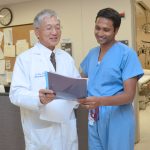

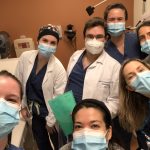
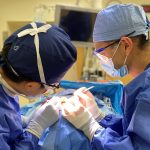
I am currently a patient at MEE Stoneham. I am being treated for glaucoma. I often question if I am proceeding in the right direction. I live alone, so my vision is extremely important to me. Am I pursuing the correct strategy or is there something more I can do. (I have been a patient of MEE for over 30 yrs.)
Hi Adeline, thanks for reading and your comment. A conversation with your doctor about treatment options for your specific case might help determine the best path forward for care.